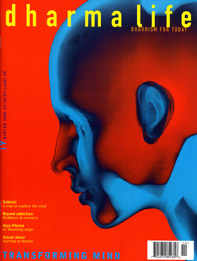Power and the Law
Thai Buddhism has faced a growing crisis in recent years as the media have exposed a series of scandals involving some of the best known monks and largest temples. Now questions facing the country's 300,000 monks have focused on a spilt between supporters and opponents of new legislation to reform how the monastic Sangha is governed. The new Sangha Bill has been proposed by the Sangha Council, which currently exercises power along with the country's ailing Supreme Patriarch. The Bill would establish a new executive 'monastic government' that would leave the Council with an overseeing role, while the Patriarch becomes a spiritual figurehead.
The bill would have been passed unopposed were it not for the intervention of Luangta Maha Bua, a popular forest monk, who objected to the lack of debate around the new provisions. Both sides mobilised large demonstrations of monks to support or oppose the legislation and the government has set up a legislative review to decide the issue. In recent years the Thai media have reported soap-opera style scandals. Exposés of some of the most prominent monks have shown them amassing collections of cars, embezzling money and property, and secretly keeping mistresses.
The first draft of the legislation proposed a virtual ban on media criticism of monks. Following protests these proposals have been toned down, but the current draft of the legislation still proposes long prison sentences for those convicted of defaming the Supreme Patriarch or the Buddhist faith. Perhaps of greatest concern for freedom of religion is the proposal that existing Thai denominations be recognised while new groups and doctrines prohibited, unless approved by the Sangha Council.
Behind this crisis lie deep-seated issues facing Thai Buddhism. One is the great wealth of many temples. Buddhist monks traditionally have eschewed money, and the laity expects them to remain distant from worldly affairs. But temples' prosperity often requires management of large property and investment portfolios, and brings the possibility of corruption. Thai abbots are appointed head of a temple for life and, according to Tongkon Vongsamutt, an opponent of the Bill, 'this lifetime tenure tends to encourage accumulation of power and wealth, and often leads to corruption'. The new bill proposes a system of trusts run jointly by monks and lay-people, to administer temple assets, but critics protest that the new system still lacks transparency.
A further issue is the centralisation of power in the hands of a small monastic elite. Historically Thai Buddhism included many diverse traditions of monastic and lay practice. But with the modernisation of Thailand over the past century the growing power of the state has been mirrored by the centralisation of monastic authority. Many local practices have been suppressed, and wandering forest monks (such as Luangta Maha Bua) have been pressurised to conform to uniform structures. He objected that the new legislation would reinforce this centralising tendency.
Both advocates and opponents of the new legislation have argued that they are standing up for the spiritual values at the heart of the Buddhist tradition. And each side has accused the other of seeking to bolster its own vested interests. It is hard for outsiders to know who is correct, but the current debate seems a healthy and perhaps overdue review of time-honoured practices in the light of changed circumstances and new challenges. It remains to be seen whether this review will be sufficiently far-reaching to restore to Thailand a Buddhism that is spiritually alive and true to its roots while remaining relevant to modern life.



